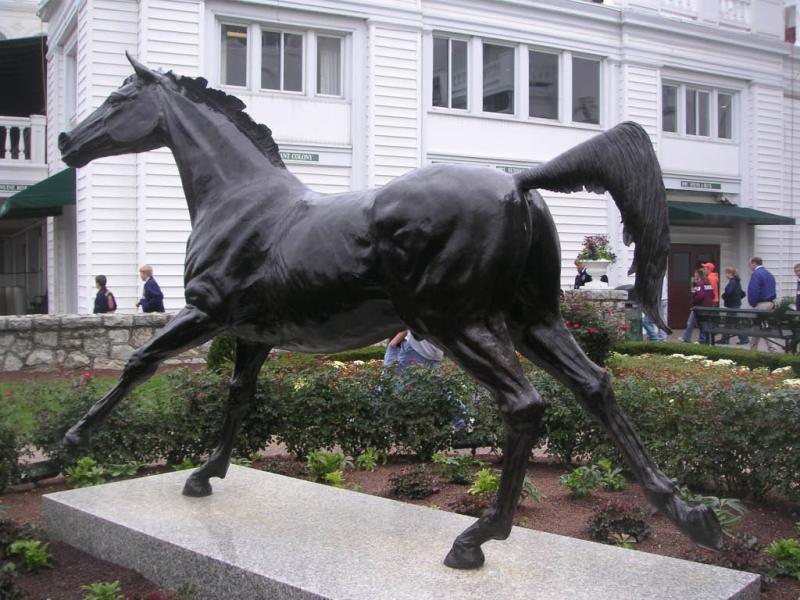The Colored Past of the Kentucky Derby
The Kentucky Derby is a time-honored American tradition dating back to 1875. Often considered “The Most Exciting Two Minutes in Sports,” the Derby draws a diverse viewership and audience to watch one of the most prestigious and recognized horse races in the world. But the Kentucky Derby also has a rich history that involves some of the earliest examples of African-American professional athletes.
During the early years of the Kentucky Derby, black jockeys and trainers were a common sight. In fact, of the fifteen contenders entered into the first derby, fourteen of the jockeys were black. The winner of the first Kentucky Derby (held May 17th, 1875) was a horse named Aristides, trained by Ansel Williamson, who was born a slave in Virginia. The jockey was Oliver Lewis, a nineteen-year-old African-American. Black jockeys were victorious in half of the first sixteen Derbies, as well as fifteen of the next twenty-eight. Furthermore, Isaac Murphy, a three-time champion of the Derby and the first man to win in successive years, is thought to have been the first millionaire athlete in America.
Unfortunately, this trend did not last long. Slowly and systematically, black jockeys and trainers were driven out of the sport following the creation of the Jockey Club, the breed registry for Thoroughbred horses, which gradually began to deny licenses to all black jockeys. The barring of black jockeys coincided with the introduction of Jim Crow laws in the South: state and local laws designed to reinforce discriminatory policies, along with other segregation policies that would further restrict the civil rights and liberties of black Americans. Following jockey Jimmy Winkfield’s departure from American racing in 1904—who had won back-to-back Derbies in 1901 and 1902—there were practically no black jockeys or trainers left in the sport. Arthur Ashe writes of the initial dominance and later decline of black jockeys in his book A Hard Road to Glory: A History of the African-American Athlete Vol. 1, citing their eventual demise from the sport as the “saddest case of discrimination” in American sport.
The sport of horse racing—and specifically the Kentucky Derby—has a unique history involving black athletes where it provided them with a platform to showcase their talents long before other sporting organizations, such as Major League Baseball or the National Basketball Association, allowed them to do so. However, what happened next was emblematic of the time: they were systematically excluded from the sport, mirroring the restrictions that blacks experienced in public life more generally. With the 142nd Kentucky Derby being run tomorrow, it is important to remember the complicated story of race in American horse racing and also to keep in mind the fact that black jockeys and trainers still remain remarkably rare in the sport to this day.
During the early years of the Kentucky Derby, black jockeys and trainers were a common sight. In fact, of the fifteen contenders entered into the first derby, fourteen of the jockeys were black. The winner of the first Kentucky Derby (held May 17th, 1875) was a horse named Aristides, trained by Ansel Williamson, who was born a slave in Virginia. The jockey was Oliver Lewis, a nineteen-year-old African-American. Black jockeys were victorious in half of the first sixteen Derbies, as well as fifteen of the next twenty-eight. Furthermore, Isaac Murphy, a three-time champion of the Derby and the first man to win in successive years, is thought to have been the first millionaire athlete in America.
Unfortunately, this trend did not last long. Slowly and systematically, black jockeys and trainers were driven out of the sport following the creation of the Jockey Club, the breed registry for Thoroughbred horses, which gradually began to deny licenses to all black jockeys. The barring of black jockeys coincided with the introduction of Jim Crow laws in the South: state and local laws designed to reinforce discriminatory policies, along with other segregation policies that would further restrict the civil rights and liberties of black Americans. Following jockey Jimmy Winkfield’s departure from American racing in 1904—who had won back-to-back Derbies in 1901 and 1902—there were practically no black jockeys or trainers left in the sport. Arthur Ashe writes of the initial dominance and later decline of black jockeys in his book A Hard Road to Glory: A History of the African-American Athlete Vol. 1, citing their eventual demise from the sport as the “saddest case of discrimination” in American sport.
The sport of horse racing—and specifically the Kentucky Derby—has a unique history involving black athletes where it provided them with a platform to showcase their talents long before other sporting organizations, such as Major League Baseball or the National Basketball Association, allowed them to do so. However, what happened next was emblematic of the time: they were systematically excluded from the sport, mirroring the restrictions that blacks experienced in public life more generally. With the 142nd Kentucky Derby being run tomorrow, it is important to remember the complicated story of race in American horse racing and also to keep in mind the fact that black jockeys and trainers still remain remarkably rare in the sport to this day.

